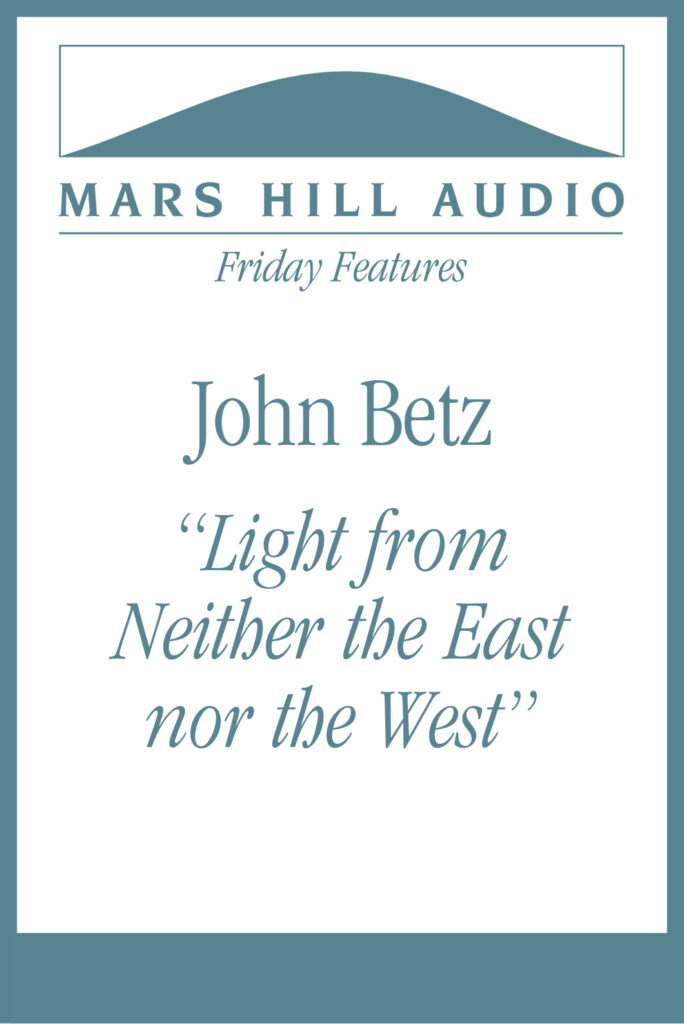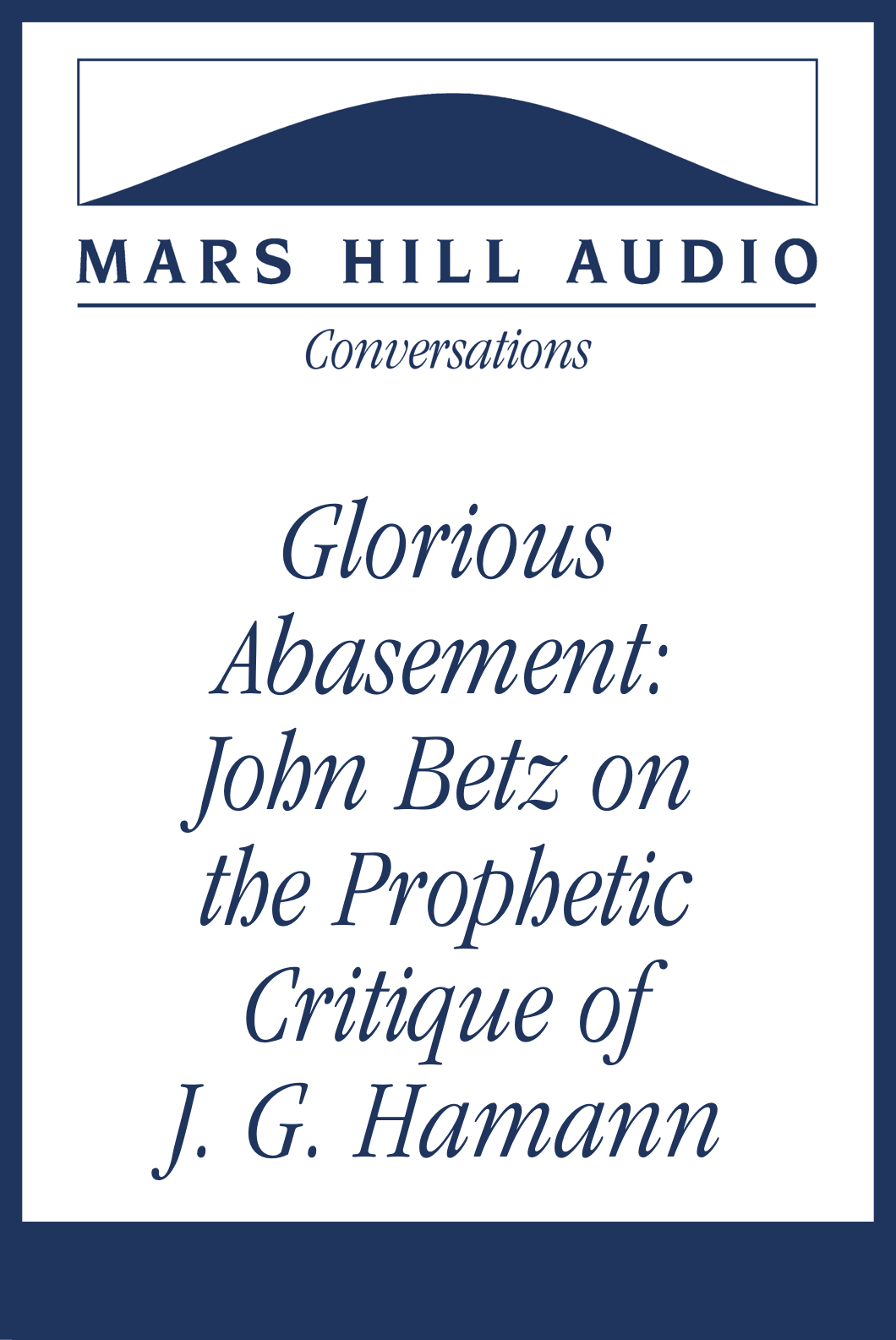released 6/30/2023
“At its best, human freedom, political freedom, is an analogue of a much greater freedom, a spiritual freedom, to which all human beings are called in Christ: the freedom of the glory of the sons and daughters of God. It is for this freedom, as Paul says in the glorious chapter 8 of Romans, that all creation most deeply longs.” So concludes theologian John Betz in the third of three essays on the meaning of freedom. The three essays were originally published online at Church Life Journal, and are presented here as an “audio reprint” by generous permission of the author and publishers. This third essay is titled “Light from Neither the East nor the West.” [NOTE: The first two essays were also released as Friday Features. They are “We Hold These Freedoms: Modern, Postmodern, Christian” and “Freedom on Holiday: The Genealogy of a Cultural Revolution.”]
41 minutes
PREVIEW
The full-length track for this audio is only available to paid members and to listeners with a free Visitor’s Pass. If you are a member, log in here. If you would like a Visitor’s Pass, sign in here. You may purchase one of our complete memberships here. Happy listening!
More to hear . . .
In 2009, John Betz was interviewed for one of our special Conversations, speaking then about his book, After Enlightenment: The Post-secular Vision of J. G. Hamann (Wiley-Blackwell, 2009) The eighteenth-century philosopher and translator, Johann Georg Hamann (1730–1788), was a critic and contemporary of Immanuel Kant and other prominent figures of the German Enlightenment. Hamann — even from the early stages of the Enlightenment — perceived and argued that the project of modernity would lead to its own destruction. Read more and listen here.
This feature is available to listeners with a Mars Hill Audio membership.
Related reading and listening
- Mars Hill Audio Journal, Volume 164 — FEATURED GUESTS: Dana Gioia, Brady Stiller, Robert Royal, Richard DeClue, Tiffany Schubert, and Joonas Sildre
- Why liberalism tends toward absolutism — In this lecture, Michael Hanby examines what causes liberalism to become dictatorial in thought and practice. (49 minutes)
- When is a market “free”? — William T. Cavanaugh argues for a richer conception of freedom than the reductionist one promoted by economist Milton Friedman. (44 minutes)
- The danger of not defining “freedom” — Richard Bauckham insists that an adequate understanding of freedom requires recognition of God as the ground of true human freedom
- The gift of objective reality — Moral philosopher Oliver O’Donovan makes an argument for the consistency of the idea of law when it is conceived in a theological context. (40 minutes)
- Freedom as conformity to reality — W. Bradford Littlejohn summarizes the definitions of liberty offered by Richard Bauckham and Oliver O’Donovan
- The Life was the Light of men — In a lecture from 2018, Ken Myers contrasts the Enlightenment’s understanding of reason with the Christocentric conception of reason. (57 minutes)
- The dance of law and freedom — Calvin Stapert on the experience of joyous order in Bach’s music
- Rejecting “two-tiered” Thomism — FROM VOL. 155 David Bentley Hart on how “two-tier Thomism” deviates from historic Christian understanding of the relationship between God and Creation. (42 minutes)
- Community, the giver of freedom — Thomas H. Naylor and William H. Willimon on why suspicion about big government shouldn’t take the form of autonomous individualism
- Freedom on Holiday: The Genealogy of a Cultural Revolution — In this second of three essays, John Betz argues that freedom for the sake of conforming to the Good has been replaced by freedom as the space to choose whatever we want. (52 minutes)
- Is irrational freedom truly freedom? — Joseph Cardinal Ratzinger argues that freedom must be understood in the context of interplay of reason and the will
- Freedom, real and counterfeit — D. C. Schindler contrasts the classical and Christian understanding of freedom with the modern understanding of freedom, and explains how true freedom is a condition of harmony with reality. (59 minutes)
- We Hold These Freedoms: Modern, Postmodern, Christian — An essay by John Betz explores the theological grounding of real freedom. He argues that human freedom cannot be understood apart from divine freedom. (36 minutes)
- God is not Zeus; you are not Prometheus — Ron Highfield addresses those who doubt Christianity’s goodness, especially as regards modern assumptions about identity, freedom, and dignity. (24 minutes)
- Power to the people — Nathan O. Hatch on the DIY spirit of early American Christianity
- Unreason destroys freedom — Joseph Cardinal Ratzinger on the relationship between freedom and truth
- Conventional “charismatic” speech, in service of the Zeitgeist — Richard Stivers on how the rhetoric of democracy invites tyranny
- Why churches should be more attentive to space — Eric O. Jacobsen discusses New Urbanism with a Christian perspective, imagining how we might organize places in which life may be lived at a human scale and in which real community is nourished. (26 minutes)
- Diagnosing our political conflicts — Michael Hanby explains why the modern pursuit of freedom — obeying its founding logic — has taken such a destructive turn. (36 minutes)
- The social context of freedom — Brad Littlejohn talks about the necessity of a more expansive understanding of freedom, one which recognizes that we are really only free within the social experience of shared meaning and mutual recognition. (17 minutes)
- The paradoxes of therapeutic culture — Stephen Gardner and Elisabeth Lasch-Quinn discuss Philip Reiff’s diagnosis of how psychology replaced the social roles of religion, morality, and custom, redefining the meaning of what is public. (39 minutes)
- The Sixth Commandment and the obligation to protect public health — Ethicist Gilbert Meilaender explains why our experience with COVID-19 has made it difficult for many — citizens and officials — to honor a proper obligation to protect public health. (17 minutes)
- Freedom, ancient and modern — In a brief excerpt from David Bentley Hart’s book Atheist Delusions, and a longer excerpt from an Areopagus Lecture by D. C. Schindler, the modern view of freedom is contrasted with the understanding of freedom present in ancient Hebrew, Greek, and Roman thought. (27 minutes)
- Perceiving the common good during a pandemic — D. C. Schindler reflects on the shape of our way of life in wake of a killer virus, seeing signs both encouraging and sinister. (35 minutes)
- Loving your neighbor during a pandemic — Brad Littlejohn reflects on how best to ask and answer some of the questions raised by our current disease-ravaged circumstances, particularly questions related to Christian freedom and love of neighbor. (29 minutes)
- Mars Hill Audio Journal, Volume 146 — FEATURED GUESTS:
Mark Mitchell, Hans Boersma, Henry T. Edmondson, III, Brian Clayton, Douglas Kries, Conor Sweeney, and Carole Vanderhoof
- Freedom and equality according to Flannery O’Connor — Three guests discuss Flannery O’Connor’s ideas: Henry T. Edmondson, III, on O’Connor’s understanding of political life; Ralph C. Wood, on O’Connor as a “hillbilly Thomist”; and Susan Srigley, on O’Connor’s sacramental and incarnational fiction. (18 minutes)
- Deconstructing the Enlightenment — Peter Leithart discusses Johann Georg Hamann’s insights about the nature of language and his prophetic critique of the Enlightenment. (17 minutes)
- Glorious Abasement: John Betz on the Prophetic Critique of J. G. Hamann — Theologian John Betz discusses the eighteenth-century philosopher and translator, Johann Georg Hamann, critic and contemporary of Immanuel Kant and other prominent figures of the German Enlightenment. (54 minutes)
- D. C. Schindler: “For Freedom Set Free” — D. C. Schindler argues that the Christian notion of religious liberty is a synthesis of the Jewish, Roman, and Greek traditions. (61 minutes)
- Is the First Amendment religiously neutral? — David L. Schindler and Nicholas J. Healy, Jr. discuss how the First Amendment is not as sympathetic to religious freedom as is commonly believed, as it is based on contestable assumptions about the nature of “religion,” “freedom,” and “human nature.” (33 minutes)
- Fischer, Hart, and Highfield on freedom — Three past guests on the Journal explore the meaning of freedom and some common modern misunderstandings of the concept — errors with real consequences. (22 minutes)
- The nature of freedom reconsidered — In anticipation of this Fall’s Areopagus Lecture entitled “‘For Freedom Set Free’: Retrieving Genuine Religious Liberty,” we present selections from interviews with three MARS HILL AUDIO guests who have raised questions about the modern understanding of freedom. (27 minutes)
- Mars Hill Audio Journal, Volume 142 — FEATURED GUESTS:
Stanley Hauerwas, Perry L. Glanzer, Nathan F. Alleman, Jeffrey Bishop, Alan Jacobs, D. C. Schindler, and Marianne Wright
- Unbearable Lightness: R. J. Snell on Acedia and Metaphysical Boredom — Philosopher R. J. Snell argues that the metaphysical boredom of modernity is sustained by our deeply-held convictions about freedom and contingency, which view the former as necessary and the latter as offensive. (48 minutes)
- Gisela Kreglinger: Victorian Wisdom for Contemporary Plights — Gisela Kreglinger considers how George MacDonald’s perspective on gender roles might guide us through some of the questions, problems, and concerns we face today. (68 minutes)
- Fulfillment is ek-static — Pope Benedict XVI summarizes the understanding of Maximus the Confessor (c.580-662) on the true nature of freedom
- Free for obedience — Glenn W. Olsen on Augustine’s understanding of freedom
- God is more than a choice — Kenneth R. Craycraft, Jr. (and Michael Sandel) on why religious freedom is poorly understood (and vulnerable)
- What is beyond our choosing? — D. C. Schindler on our nihilistic quest for freedom
- What Ockham severed — Jean-Charles Nault on the advent of sheer freedom
- Progress in the void — R. J. Snell on modernity’s preference for freedom over the good
- Command and liberation — Oliver O’Donovan on the freedom of living under authority
- Principles have to be discovered, not chosen — Alasdair MacIntyre on the problem of natural law and contemporary culture
- “Freedom” as tyranny — Stanley Hauerwas and William H. Willimon on democracy, desire, and freedom
- Radical faith in the nothing — David Bentley Hart on the nihilism of worshiping mere choice
- How the Church promotes the cause of freedom — Oliver O’Donovan: “We discover we are free when we are commanded by that authority which commands us according to the law of our being, disclosing the secrets of the heart.”
- Stanley Hauerwas on the modern idea of freedom — Stanley Hauerwas: “Protestant churches in America lost the ability to maintain the disciplines necessary to sustain a people capable of being an alternative to the world.”
- Mars Hill Audio Journal, Volume 118 — FEATURED GUESTS: Gilbert Meilaender, Ron Highfield, Mark Mitchell, Daniel M. Bell, Jr., Helen Rhee, and Peter Brown

